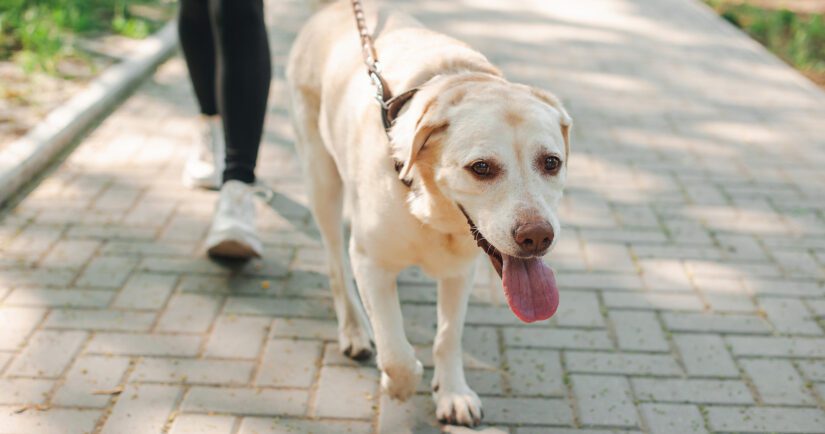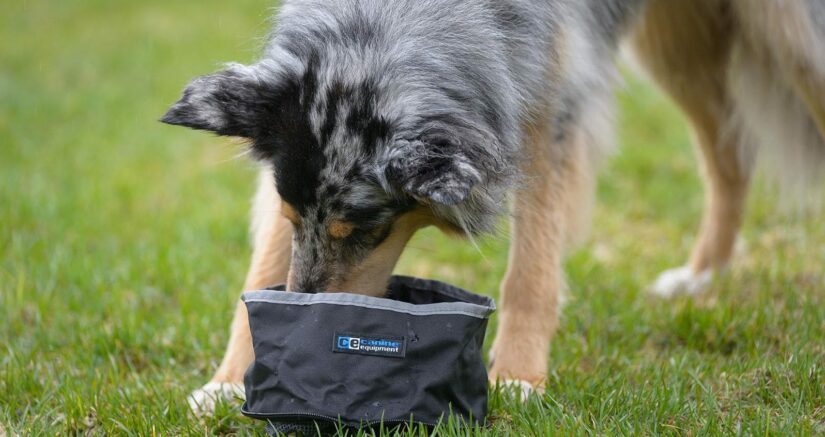With warmer weather comes lots of outdoor activities for you and your pet to enjoy together. While it’s easy to become distracted with all the fun you are going to have together, it’s important to plan ahead and make your pet’s safety a priority by watching out for some of these potential hazards.

1. Hydration and heat safety
- Provide constant access to cool, clean water and shade. Ensure that your pets have access to fresh, clean water at all times. Place water bowls in various shaded areas to keep them cool and prevent evaporation.
- Walk pets during cooler times of the day to avoid hot pavement. Pavement and sidewalks can become scorching hot during the summer, potentially burning your pet’s paws. Aim for walks during the early morning or late evening when temperatures are cooler.
- Learn to recognize signs of heatstroke. Symptoms of heatstroke in pets include excessive panting, drooling, agitation, and increased heart rate. If you notice any of these signs, move your pet to a cooler area immediately and consult a veterinarian.
- Never leave an animal alone in a hot vehicle. Owners and caretakers may believe they’re doing their furry friend a favour when bringing them along on errands, but if they can’t bring their pet into a store they may think a few minutes in the vehicle won’t be a big deal.
2. Outdoor adventures
Taking your pet out for a hike, overnight camping, or even some paddle boarding, is a great way to enjoy the outdoors together, but be prepared to avoid potential issues.

- Ensure vaccinations are up-to-date for protection against wildlife-borne viruses. Regular vaccinations are essential to protect your pets from diseases they may encounter outdoors, such as rabies or leptospirosis. Consult your veterinarian to ensure your pet’s vaccinations are current.
- Register your pet with Pet Registry for easier identification if they accidently wander off. If your pet gets lost during outdoor activities, having them registered in a pet database increases the chances of a swift reunion. Make sure your contact information is up-to-date. Learn more about pet id.
- Outfit dogs with properly fitted life vests for water activities. If you plan to take your dog on boating or swimming adventures, invest in a well-fitted life vest designed for pets. This provides extra buoyancy and ensures their safety in the water.
- Pack essential supplies for pets on long hikes. Just like you would pack food, water, and first aid supplies for yourself, don’t forget to bring along essentials for your pet. Consider items such as collapsible bowls, extra water, pet-friendly sunscreen, and any necessary medications.
3. Picnic Precautions
Party food is great for humans – not so much for pets. Before you set that picnic blanket down, make sure your dog can’t get into the following dangerous or poisonous picnic foods.

- Avoid feeding pets harmful picnic foods. Many common picnic foods are toxic to pets, including cooked bones, onions, garlic, grapes, chocolate, and corn on the cob. Keep these items out of reach and opt for pet-safe alternatives. Cooked meat bones can become a choking hazard, they can easily splinter when chewed by your dog and the splinters can cause damage when chewed and/or swallowed.
- Provide pets with their own food. Pack a separate meal for your pets to enjoy during picnics. Consider freezing pet-friendly treats inside a Kong toy to keep them entertained and hydrated.
- Safeguard cooking areas to prevent access to hazardous items. Keep pets away from hot grills and cooking areas to avoid burns and ingestion of harmful substances. Use covered containers to dispose of bones and other potential hazards.
- Keep food waste secure. Have a covered container readily available to collect bones from grilled chicken, ribs, and other meats. This prevents your dog from accessing potentially harmful food scraps and reduces the risk of choking or digestive issues.
4. Bug bites and stings
We aren’t the only ones who need to worry about bug bites in the summer. Pets can suffer from them too. In fact, you shouldn’t take bug bites and stings lightly when it comes to pets since life-threatening bacteria, viruses and parasites can be transmitted to your pets through them.
- Ticks can wreak havoc on an animal, especially as your dog will spend most of their time outside. The tiny parasites feed off the blood of hosts, including dogs and cats. Tick bites and tick-borne diseases, like Lyme disease, can be hard to detect.
- It can take anywhere between seven and 21 days (or longer) for the symptoms to present themselves. Utilize safe medications and conduct thorough tick checks. Use veterinarian-approved flea and tick preventatives to protect your pets from parasites. After outdoor activities, thoroughly check your pet for ticks, especially in areas like ears, armpits, and between toes. More on ticks.
- Bee, hornet, and wasp stings are common concerns for pet owners, as curious animals often investigate their surroundings with their noses and paws, making them vulnerable to stings in these areas. Typically, you may notice mild swelling and tenderness at the sting site. Applying a cold compress can help alleviate swelling and discomfort.
- It’s crucial to remove the stinger promptly to prevent further venom exposure. Avoid squeezing the stinger, as this could rupture the venom sac. Instead, gently scrape it out with a blunt object, such as a credit card, in the direction opposite to the entry.
- While some may consider administering Benadryl to pets for relief, it’s important to seek veterinary guidance before doing so. Incorrect dosage or usage can pose risks to your pet’s health.
- In severe cases, pets may exhibit signs of anaphylactic shock, such as vomiting and pale gums, within minutes of being stung. If you observe these symptoms, seek immediate veterinary assistance to prevent further complications.
5. Summer Toxins
During the summer months, certain items commonly used by humans can pose risks to our furry companions. Here are some of the most common summer toxins.

- Sunscreen: If you’re contemplating applying sunscreen to your pet, it’s crucial to consult your veterinarian first. While sunscreen may offer benefits for certain dogs, it’s important to weigh the potential risks. If you proceed with sunscreen application, opt for a pet-specific or baby formula to minimize adverse effects. Ensure that your pet doesn’t ingest the sunscreen, as some ingredients can be harmful if ingested.
- Gardening Products: Our gardens can harbor various hazards for our pets, including plant bulbs, fertilizers, and lawn products. Some of these substances can be toxic if ingested by dogs and cats. When tending to your plants, opt for non-toxic alternatives to safeguard your pet’s well-being. This allows your furry friend to explore and play in the garden without worry of exposure to harmful substances.
More articles like this:
- Harmful summer toxins for your pet to avoid
- Spread the word: Don’t leave your pet in a hot car
- Top tips for protecting your pet’s paws from hot pavement
- Easy ways to keep your pet cool at home
- Leaving dog in cars: Avoid heat exhaustion and save lives
- Toxic for dogs: What to avoid feeding Fido
- Tick-tock: No time like the present to check your pets for ticks
Get updates from the BC SPCA
Want to receive more news stories like this, right in your inbox? Use the form below to subscribe for updates.
The BC SPCA uses your personal information to update you on our work for animals as well as for advertising and analytics purposes. More information on uses and how to opt-out can be found in our Privacy Policy.
